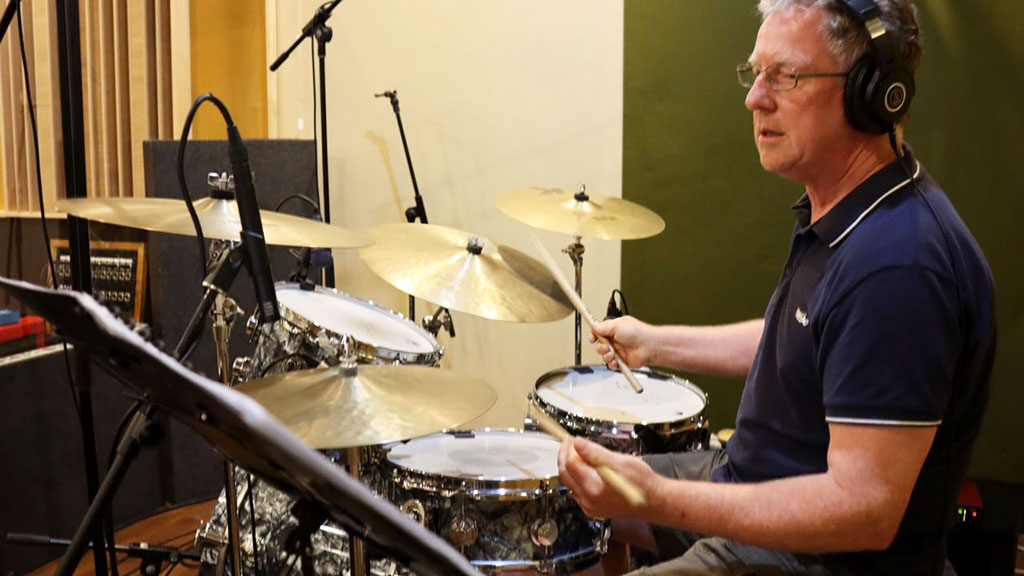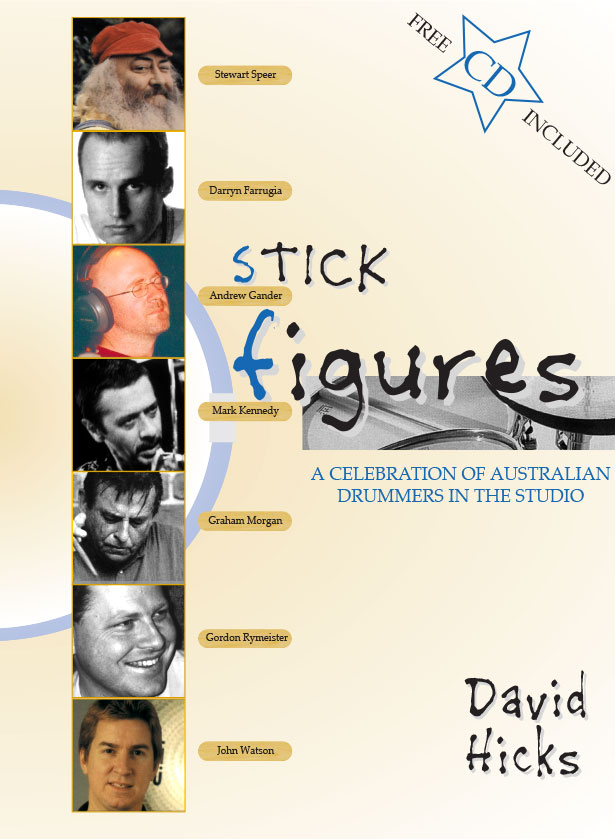Studio Drummer Advice
Studio Drumming FAQs
Author of the studio drummer book “Stick Figures” and professional drummer of 50+ years, David Hicks, reveals some of the secrets to being a great studio drummer…
What is a studio drummer?
A studio drummer is a drummer that is hired as a contractor to record drum parts for music, in most cases, music that has already been composed. This brings different challenges than a drummer who belongs to a band, recording music he/she is familiar with. The studio drummer must possess a professional skill set, versatility, and maturity. As well as popular music styles, they can encounter film soundtracks, commercials, orchestral or big band settings and so on.
How can I be a good drummer in the studio?
By having established drum kit skills and professional equipment, experience, and willingness to play whatever is requested on the day. Sometimes the person running the session will not be sure exactly what they want, so flexibility is also key.
Often the drummer must record a performance as quickly as possible to keep costs down. Also, music reading ability can help this process.
Who is the most prolific studio drummer?
Not easy to measure, and what is it we are really asking here – is the number of sessions recorded reflective of how good a musician is? Studying the great recorded drummers of the last five decades can point the way. Names that frequently occur on the biggest-selling albums, e.g., Steve Gadd, J.R Robinson, and so on, would be at or near the top of the list.
What is the role of the drummer in a band?
Although a session drummer’s situation is different from being in a band – the drummer’s role in music generally is to keep time consistently, play appropriate parts for the song, and be the glue that helps the whole team have a positive experience. It’s illuminating to read what singers and other non-drumming musicians say about what qualities they look for in drummers.
Do drummers get paid?
Of course, unless they foolishly allow themselves to work for nothing! If, however, you record with a band producing original music, you might have to do some sessions for them free. At least you get the satisfaction of hearing your product preserved for posterity. Rates of pay differ in each country; you can research with local unions what they expect.
It’s generally on a ‘per three-hour call’ basis. You might be able to negotiate above the base rate according to your own experience and skill level. Personally, I will adjust my rate down a bit for independent artists if they are on a limited
budget.

What are the qualities of a good drummer?
- Mastery of your drum kit (including reading, tuning etc.) Instruction helps here.
- Rock-solid timing.
- Thorough knowledge of music styles.
- Willingness to obey instructions from others.
- Calmness under pressure.
- A sense of humour helps everyone enjoy the session, and perhaps look forward to working with you again.
- Confidence, maturity, taste, discretion and pleasant disposition.
Is it harder to be a drummer or a guitarist?
I play several instruments. I feel all instruments are equally challenging. However, it’s clear that anyone can make a passable sound almost straight away on a drum, compared to some instruments which might take some time to establish tone etc. (e.g. trumpet). Another variable is the natural affinity someone might have for a certain instrument, usually noted when they first try it. Drumming ability can be enhanced by having some skills on alternative instruments.
Am I too old to be a drummer?
Never, because today you can play at any level which suits you, tailoring your equipment choices to your needs (and those of your neighbours!). As long as you don’t have any physical or mental limitations which stop you from holding sticks or sitting at a drum kit, you can have a go. There are many older drummers out there enjoying jamming with others their age.
Who is the most recorded drummer ever?
Impossible to measure. More of a matter of your opinion compared to mine. Perhaps what one is really asking is ‘who is the best studio drummer ever?’ – an equally impossible question to answer definitively. Not everything in art can be quantified. For example, I have often answered questions from students about who is the fastest drummer with “ In nearly fifty years of my career, I have never been asked by an employer how fast I play.”

What does a studio drummer do?
They are hired as a contractor to record drum parts for music, in most cases, music that has already been composed and that the drummer may not have heard before. Often they are expected to record their performance as quickly as possible to keep costs down. Also, the ability to read music can help this process.
How do I become a successful studio drummer?
Firstly by establishing mastery of your drum kit. Then by networking. Performing in public is a big help. At all times you must be professional and easy to get along with. A bit of luck and timing also contributes to a career (as it does in any profession).
What are the skills required to be a studio drummer?
Being a studio drummer is not just about being able to play drums well. It requires a set of specific skills and attributes that are essential for success in the studio environment.
Firstly, mastering your drum kit is a must, including reading music, tuning, and having a good understanding of different drumming techniques. You must also have rock-solid timing and a thorough knowledge of various music styles, so you can easily adapt to different recording sessions.
Secondly, it’s important to be willing to obey instructions in the studio. A studio drummer must be able to take direction from the producer, engineer, and other members of the production team. This means being flexible and adaptable in your playing to ensure you meet the desired sound and vibe for each recording.
Thirdly, calmness under pressure is essential. Recording sessions can be intense, with multiple takes and revisions. As a studio drummer, you must be able to keep your cool, maintain focus, and deliver a consistent performance, even under pressure.
Lastly, a sense of humor goes a long way. Being able to keep the mood light and enjoyable during the session can help build good rapport with the rest of the team. If everyone enjoys working with you, it’s more likely that you’ll get repeat work and build a strong reputation as a reliable and skilled studio drummer.
What are some tips for recording drums in a studio setting?
Check out the many useful advice blogs on the web. There is much to learn and many alternative ways of achieving good results. Certainly start with having the best drums you can afford and properly tuned near-new heads. Of course, whoever is engineering (as well as what equipment they use/what room you record in) greatly influences the outcome.
How do you prepare for a recording session as a studio drummer?
Firstly by establishing mastery of your drum kit (including reading, tuning etc.). Buy the best drums you can afford, and set up with near-new heads, properly tuned. If possible, study and play along with the music you intend to record at home, before the session, and perhaps make guide notes.
What equipment do I need to be a studio drummer?
Professional-level drums, cymbals and accessories. Imagine if you set up with great-sounding drums, then your cheap bass drum pedal fell apart in the first song? If you can afford it, have alternate snare drums and cymbals in case a different texture is needed.
What is the typical pay for a studio drummer?
It’s different in each country; you can research with local unions what they expect. It’s generally on a ‘per three-hour call’ basis. You might be able to negotiate above the base rate according to your own experience and skill level.
Personally, I will adjust my rate down a bit for independent artists if they are on a limited budget.
How do I get hired as a studio drummer?
If only there was ‘the perfect answer’ to this one. You take care of all the fundamental steps mentioned above and hope that it all comes together. Expect to pay your dues for many years before you might taste success. But then the drummers who live for drumming will keep doing it, even without ‘success’!
What are the differences between live drumming and studio drumming?
Generally, the rule of thumb is, to play more economically in the studio than live. Also, because every nuance of your playing is ‘magnified’ in the studio, you might need to be more consistent and clear, i.e., more disciplined.
How do I stay relevant as a studio drummer in an ever-changing industry?
Keep learning new styles and techniques, even those you don’t think you will need. Be willing to adapt. For me, some success I have had has been because I’m willing to take on new challenges and go into musical areas I don’t know well.
That happened in 1989 when I subbed in a pit orchestra for the first time, leading to 30 years of freelance work in that style. Also, I keep learning about microphones, equalisation, mixing, etc. so I have lots of skills ready for whatever
challenges arise during sessions.
Studio Drumming Book
"Stick Figures"

7 legendary Australian studio drummers discuss their secrets to recording drums in the studio. They have recorded with international and Australian artists, as well as recorded drums on soundtracks for movies, television and commercials.